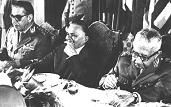EVIDENCE OF A SERIOUS CONFLICT OF INTERESTS IN THE U.S. GOVERNMENT OVER IRAQ
There is substantial evidence that America's interest in Iraq is motivated by oil, not just national security. Is the U.S. government being open and honest about their reasons for declaring war on Iraq? Read the evience and decide for yourself.
PROOF - WAR ON IRAQ IS FOR OIL
Bush decided to invade Iraq in April 2001, six months before September 11th, and the official reason was to improve Western access to Iraqi oil.
"President Bush's Cabinet agreed in April 2001 that 'Iraq remains
a destabilising influence to the flow of oil to international markets
from the Middle East' and because this is an unacceptable risk to
the US 'military intervention' is necessary."[1]
The decision for military action had nothing to do with 9/11, the war on terrorism, the UN weapons inspections, weapons of mass destruction, Iraqi human rights, or any of the factors that the US government would like you to believe are the true motives for war.
The only people who will benefit from the war on Iraq are the elite wealthy oil men who finance Bush's election campaigns, and people like Bush who have huge personal investments in the oil industry. Oil company profits have already increased by fifty percent this year because of the war, and the invasion hasn't even started yet!
"Profits in the fourth quarter soared 50% to $4.09bn (£2.5bn),
beating analyst expectations."[2]
War-time propaganda tells you what you want to hear; that your politicians have noble motives for the war on Iraq.
Before you choose what to believe, have you considered the facts[3] for yourself?
SOURCES:
[1] Sunday Herald newspaper (UK), "Official: US oil at the heart of Iraq crisis", 6 October 2002.
[2] BBC News (UK), "Oil prices lift ExxonMobil", 30 January 2003.
[3] Council on Foreign Relations, "Strategic Energy Policy Challanges for the 21st Century", April 2001.
US VICE-PRESIDENT CHENEY SHARES OUT IRAQ'S OIL
Halliburton, an oil services company based in Bush's home-state of Texas, which was formerly run by US Vice-President Dick Cheney, has already been awarded a contract by the US government to operate in post-war Iraq.[1]
"Reports in the Wall Street Journal suggested the
contracts could be worth as much as $900m."[2]
Haliburton "has a history of government contracts" and will be a "leading beneficiary" of the war on Iraq. Mr Cheney should receive huge financial rewards for the war on Iraq through substantial investments in the corporation he once headed.
Iraq is currently the world's second largest source of oil, but the majority of subterranean oil reserves have never been tapped. After the war, when US oil corporations have fully developed the oil industry's potential, Iraq is expected to become the largest single supply of oil on Earth.
"The new oilfields, when developed, could produce up
to eight million barrels a day within a few years - thus
rivalling Saudi Arabia, the present kingpin of oil."[3]
The world's largest oil corporations are lining-up to exploit what could be the world's greatest supply of oil, and the US government has ensured that companies owned and heavily invested in by America are first in the queue.[4]
SOURCES
[1] Evening Standard (UK), "Cheney under fire over spoils of war", 11 March 2003.
"THE company once headed by US Vice-President
Dick Cheney is set to be a big corporate winner in the
event of a war with Iraq that ended in US victory."
[2] BBC News (UK), "US firms vie to rebuild Iraq", 10 March 2003.
"Aside from Halliburton unit Kellogg Brown and Root,
they include Bechtel, Fluor, Louis Berger and Parsons.
All five are US-owned and headquartered."
[3] Evening Standard, "Is this war all about oil?", 11 March 2003 (PM).
"In the past few days the United States has brought
unprecedented financial pressure on other members
of the UN Security Council - particularly Russia, so
far without success - to join the war on Iraq."
[4] Evening Standard, "Giants see post-war oil bonanza", 10 March 2003.
"President Saddam Hussein is believed to be sitting on
reserves of at least 115bn barrels, the second-biggest in
the world after Saudi Arabia."
FURTHER READING
BBC News, "Oil firms 'discuss Iraqi stake'", 12 March 2003.
"Oil firms BP and Shell [both owned primarily by big
investors in the US and the UK] have held discussions
with the government over a possible stake in Iraq's oil
reserves..."
Washington Post (USA), "Companies Selected to Bid on Iraq Reconstruction", 11 March 2003.
"The Bush administration, preparing what would be
the most ambitious U.S. rebuilding project since the
aftermath of World War II, expects in coming days to
award a construction contract worth hundreds of
millions of dollars to begin remaking Iraq, U.S. officials
said yesterday."
"A few U.S. construction giants -- including the Bechtel
Group Inc., Halliburton Co. and Fluor Corp. -- were
invited to bid for the work..."
BBC News, "Analysis: Oil and the Bush cabinet", 29 January 2001.
"What makes the new Bush administration different
from previous wealthy cabinets is that so many of
the officials have links to the same industry - oil."
BBC News, "Dick Cheney: Leading hawk", 10 September 2002.
"The vice president has also been deeply involved in the
oil industry for much of his career."
BBC News, "New Enron sleaze allegations", 8 October 2002.
"The 'creative' accountancy of Arthur Andersen in Dick
Cheney's firm Halliburton is now under official
investigation."
.
.
.
.
muito mais em
http://www.thedebate.org/thedebate/iraq.asp






.jpg)
